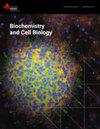Effects of clopidogrel bisulfate on B16-F10 cells and tumor development in a murine model of melanoma.
IF 2.4
3区 生物学
Q3 BIOCHEMISTRY & MOLECULAR BIOLOGY
引用次数: 0
Abstract
Metastatic melanoma is a very aggressive skin cancer. Platelets are constituents of the tumor microenvironment and, when activated, contribute to cancer progression, especially metastasis, and inflammation. P2Y12 is an adenosine diphosphate (ADP) receptor that triggers platelet activation. Inhibition of P2Y12 by clopidogrel bisulfate (CB) decreases platelet activation, which is also controlled by the extracellular concentration and the metabolism of purines by purinergic enzymes. We evaluated the effects of CB on the viability and proliferation of cultured B16-F10 cells. We also used a metastatic melanoma model with C57BL-6 mice to evaluate cancer development and purine metabolism modulation in platelets. B16-F10 cells were administered intraperitoneally to the mice. Two days later, the animals underwent a 12-day treatment with CB (30 mg/kg by gavage). We have found that CB reduced cell viability and proliferation in B16-F10 culture in 72h at concentrations above 30 μM. In vivo, CB decreased the tumor nodule counts and LDH levels and increased platelet purine metabolism. Our results showed that CB has significant effects on melanoma progression.硫酸氢氯吡格雷对小鼠黑色素瘤模型中B16-F10细胞和肿瘤发展的影响。
转移性黑色素瘤是一种侵袭性很强的皮肤癌症。血小板是肿瘤微环境的组成部分,当被激活时,会促进癌症的进展,尤其是转移和炎症。P2Y12是一种触发血小板活化的腺苷二磷酸受体。硫酸氢氯吡格雷(CB)对P2Y12的抑制降低了血小板活化,血小板活化也受到细胞外浓度和嘌呤能酶对嘌呤的代谢的控制。我们评估了CB对培养的B16-F10细胞的活力和增殖的影响。我们还使用C57BL-6小鼠的转移性黑色素瘤模型来评估癌症的发展和血小板中嘌呤代谢的调节。将B16-F10细胞腹膜内给予小鼠。两天后,动物接受为期12天的CB(灌胃30 mg/kg)治疗。我们发现CB在浓度超过30µm的B16-F10培养物中72小时内降低了细胞活力和增殖。在体内,CB降低了肿瘤结节数和乳酸脱氢酶水平,并增加了血小板嘌呤代谢。我们的研究结果表明CB对黑色素瘤的进展有显著影响。
本文章由计算机程序翻译,如有差异,请以英文原文为准。
求助全文
约1分钟内获得全文
求助全文
来源期刊

Biochemistry and Cell Biology
生物-生化与分子生物学
CiteScore
6.30
自引率
0.00%
发文量
50
审稿时长
6-12 weeks
期刊介绍:
Published since 1929, Biochemistry and Cell Biology explores every aspect of general biochemistry and includes up-to-date coverage of experimental research into cellular and molecular biology in eukaryotes, as well as review articles on topics of current interest and notes contributed by recognized international experts. Special issues each year are dedicated to expanding new areas of research in biochemistry and cell biology.
 求助内容:
求助内容: 应助结果提醒方式:
应助结果提醒方式:


